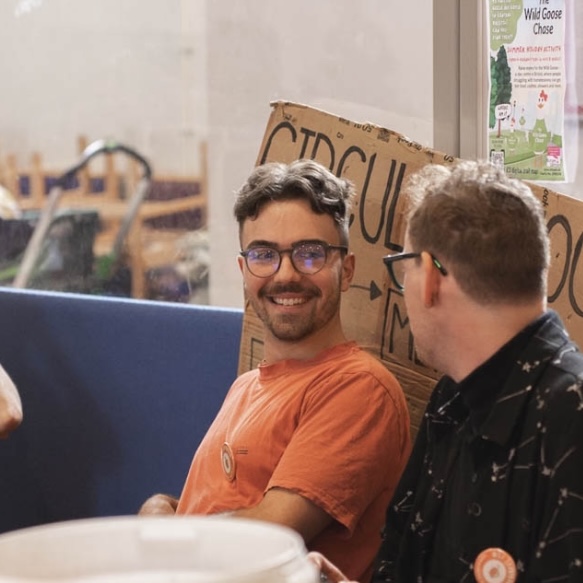Why Generation Soil’s Living Compost Stands Out from the Rest
- Alex Montgomery
- Jul 14, 2025
- 3 min read
Updated: Oct 14, 2025
If you’re looking to buy compost in Bristol for your garden, allotment, or market garden, the choices can feel endless. Bags of “multi-purpose” compost fill the shelves, and cheap council compost is easy to find, but not all composts are created equal.
At Generation Soil CIC, we do things differently. Our living compost is handcrafted in Bristol from local food waste and woodchip, packed with beneficial microbes, and designed to regenerate soil, not just feed plants.

What Makes a Good Compost?
Before buying compost, it’s important to understand what separates an average compost from a truly regenerative one.
A high-quality compost should:
Improve soil structure and long-term fertility
Support beneficial microorganisms like fungi, bacteria, and earthworms
Hold moisture while still draining freely
Provide a balanced range of nutrients
Be free from plastics, chemicals, and weed seeds
Be peat-free and sustainably produced
When you search for “best compost for vegetables” or “organic compost UK,” look for compost that supports soil biology and closes the loop between food waste and food production.
Comparing Common Types of Compost
Let’s take a look at what’s available and why most composts don’t go far enough to regenerate soil.
1️⃣ Municipal Waste Compost
Made from green waste (grass clippings, hedge trimmings, and leaves) collected by local councils.
✅ Pros:
Free or very low cost
Diverts waste from landfill
Easy to access
❌ Cons:
Quality can vary from batch to batch
Risk of plastic or glass contamination
Often alkaline or high in salts
Lacks microbial diversity
Not always peat-free or organic
👉 Good for mulching, but not ideal for growing food or seedlings.

2️⃣ Commercial Bagged Compost
The most common option is at garden centres or online retailers.
✅ Pros:
Convenient and easy to use
Often labelled for specific purposes (e.g. seed compost, potting mix)
Some brands now offer peat-free options
❌ Cons:
Mass-produced using industrial processes
May include synthetic fertilisers or additives
Often sterile, lacking microbial life
Long, fossil-fuel-heavy supply chains
May not truly be “organic” or “local”
These composts grow plants, but they don’t build living soil.
Why Generation Soil Compost Is Different
Our compost is designed not just to grow crops, but to regenerate the Earth beneath them.
Made from Local Food Waste and Woodchip
We collect food scraps from Bristol households and businesses, blend them with larch and Douglas fir woodchip, and ferment them using natural microbes. This creates the perfect carbon-to-nitrogen balance for rich, living compost.
Packed with Microbial Life
Every handful of Generation Soil compost teems with bacteria, fungi, protozoa, and nematodes, the tiny workers that power soil health, improve nutrient cycling, and help plants resist disease.
100 Per Cent Peat-Free and Chemical-Free
We never use synthetic fertilisers, peat, or chemical accelerants. Our process supports microbial fermentation and carbon capture, not depletion.
Made by Hand in Small Batches
Produced at our Food Forest Market Garden in Bristol, every batch is monitored for temperature, structure, and microbial balance, ensuring top quality while keeping nutrients local.
Supports Wildlife, Soil, and Wellbeing
By choosing living compost, you support Bristol’s circular food system, reducing waste, improving biodiversity, and reconnecting people with nature.

What You Can Use Generation Soil Compost For
Perfect for:
Vegetable gardens and no-dig beds
Allotments and raised planters
Fruit trees, shrubs, and perennials
Potting up seedlings (mixed with loam or coir)
Making compost teas and soil inoculants
Whether you’re a home gardener, a school, or a community project, this compost helps build living soil for long-term fertility.

Compost Comparison
Feature | Generation Soil | Municipal Compost | Commercial Compost |
Ingredients | Food waste + wood shavings | Green waste | Varies widely |
Peat-Free | ✅ Yes | Sometimes | Sometimes |
Chemical-Free | ✅ Yes | Uncertain | Often no |
Microbial Life | ✅ Rich & diverse | Limited | Limited |
Sustainability | ✅ Local & circular | Industrial-scale | Imported |
Best for Growing Food | ✅ Absolutely | Not ideal | Depends on brand |
Where to Buy Generation Soil Compost
If you’re looking for regenerative compost in Bristol or searching for the best compost for vegetables UK, you can order directly from our website or find us at local Bristol markets.
By choosing our compost, you’re helping to:
Regenerate Bristol’s soils
Reduce food waste
Build a circular food system
Final Thoughts: Compost That Regenerates
Compost isn’t just garden waste; it’s the foundation of life.
Every handful of Generation Soil Living Compost contains billions of microorganisms working together to restore fertility, biodiversity, and balance.
When you use our compost, you’re not just growing plants, you’re helping regenerate Bristol’s soil, strengthen local food systems, and nourish the Earth itself.
Let’s heal the ground beneath our feet, one bucket of living compost at a time.




Comments